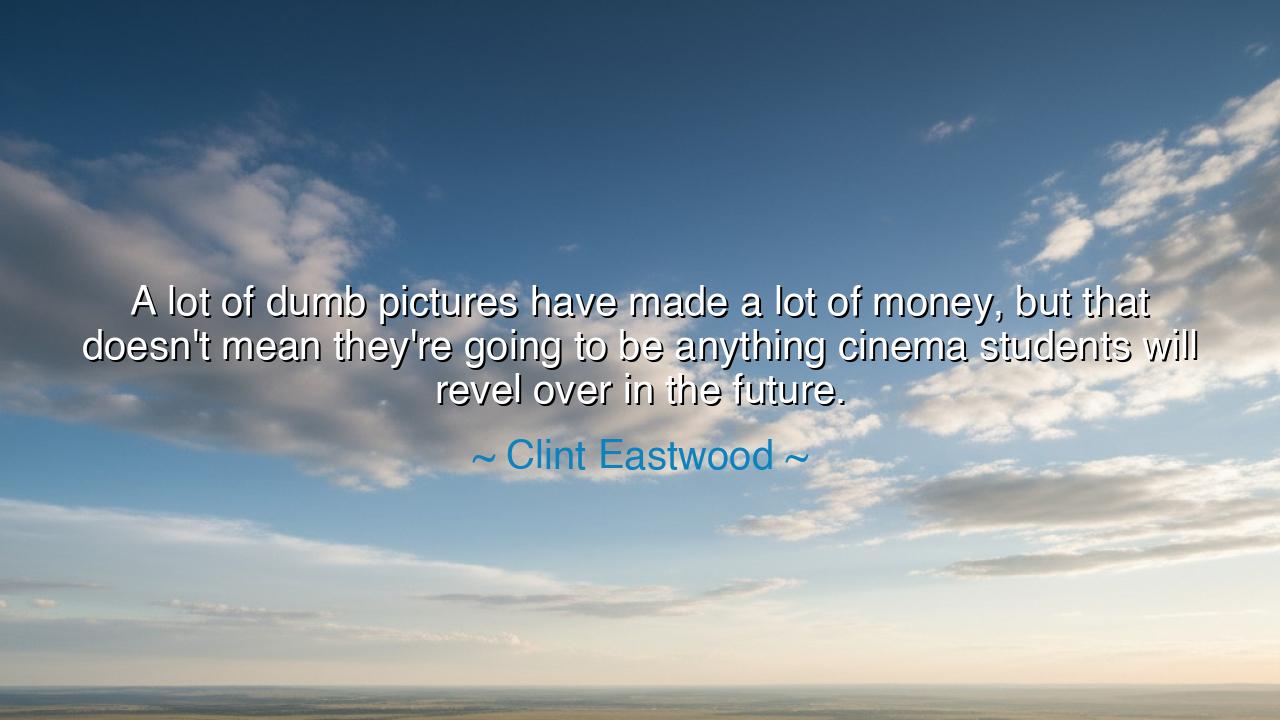
A lot of dumb pictures have made a lot of money, but that doesn't
A lot of dumb pictures have made a lot of money, but that doesn't mean they're going to be anything cinema students will revel over in the future.






The venerable filmmaker and actor Clint Eastwood, a man whose career spans generations and whose voice carries the gravel of experience, once declared: “A lot of dumb pictures have made a lot of money, but that doesn’t mean they’re going to be anything cinema students will revel over in the future.” In these words lies a truth as old as art itself — that greatness is not measured in coins but in legacy. Eastwood, a craftsman who rose from the raw frontier of Westerns to become one of cinema’s most enduring storytellers, reminds us that profit is fleeting, but art endures. His words echo the timeless divide between the works that entertain and those that illuminate.
In the manner of the ancients, let us understand this not merely as a statement about film, but as a meditation on all creation. For in every age, there have been two kinds of makers: those who chase applause, and those who chase truth. The first labor for reward, for fame, for the fleeting glitter of success. The second labor for meaning, to hold a mirror to the human soul. Eastwood’s words warn us that the measure of value is not found in the market’s noise but in the quiet reverence of time. When he says that “cinema students will not revel” in such works, he means that the judgment of history will favor integrity over indulgence, substance over spectacle.
The origin of this wisdom lies in Eastwood’s own journey through the film industry — an industry that often worships novelty and profit. He came of age in an era of Hollywood glamour, yet he never surrendered to it. As both actor and director, he sought not to dazzle but to endure. Films like Unforgiven, Million Dollar Baby, and Gran Torino are not loud in their ambition; they are quiet, human, timeless. Through them, he has taught that the artist’s duty is not to please the moment, but to speak to eternity. Thus, when Eastwood dismisses the “dumb pictures” that make fortunes, it is not out of arrogance, but out of reverence — reverence for the art form he has devoted his life to preserving.
Consider the tale of Orson Welles, the young prodigy who, at twenty-five, made Citizen Kane — a film that, in its time, failed to make money but would later be hailed as one of the greatest ever created. Welles’ work was too daring, too unconventional for the audience of his day. Yet decades later, it became a beacon for filmmakers, studied not for its profit but for its vision. Contrast this with countless blockbusters whose names fade within years of release, their record-breaking profits turned to dust. This is the truth Eastwood speaks of: what is popular is not always profound, and what is profound often waits in silence to be discovered by the patient eyes of the future.
There is wisdom here that extends far beyond cinema. In every craft — whether painting, writing, or leading — there will be the temptation to chase numbers, approval, or fame. But as Eastwood reminds us, art and meaning are not born of compromise. The world may celebrate mediocrity for a moment, but history sanctifies sincerity. The artist, like the philosopher, must build not for today’s applause but for tomorrow’s awakening. The applause fades; the truth remains. To create with integrity is to trust that time, the ultimate critic, will do justice to one’s work.
O children of ambition, heed this teaching: success is not always virtue. Do not confuse wealth with worth, nor popularity with power. Seek instead the quiet strength of craftsmanship. Build works that will be studied, not merely consumed. Whether your field is art, science, or service, do not ask, “Will it sell?” but rather, “Will it matter?” Eastwood’s words remind us that those who chase meaning may walk a lonelier path, but it is their footprints that last longest upon the sands of time.
And so, let the lesson of Clint Eastwood endure: create not for the crowd, but for the centuries. The works that will be “revered by cinema students” — or by any seeker of wisdom — are those made from conviction, not calculation. Be patient with your craft. Let integrity be your compass and truth your reward. For the art that speaks from the soul will one day find its audience, even if the world is not ready to hear it now. In this, Eastwood stands as a living oracle of his age — a reminder that though “dumb pictures” may glitter in their hour, it is honesty, depth, and vision that light the fires of eternity.






AAdministratorAdministrator
Welcome, honored guests. Please leave a comment, we will respond soon